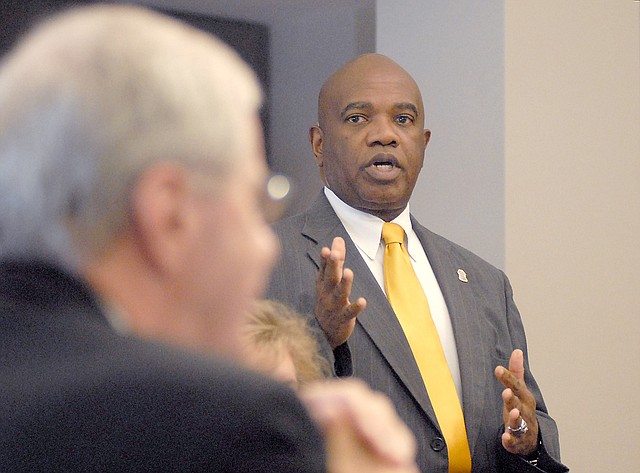Police union worried chief's contract could alter pension plan
Saturday, March 27, 2010
A proposed contract to keep Chattanooga police Chief Freeman Cooper on the job after he retires has some union leaders worried about changes to the police and firefighter pension plan.
"While most would agree that Chief Cooper is a fine chief, anytime rules are changed mid-game, it raises an eyebrow," said Sgt. Craig Joel, vice president of the Fraternal Order of Police.
Mayor Ron Littlefield has proposed that Chief Cooper be signed to a three-year contract at his current salary of $116,822 a year, plus allow the chief to draw a pension of almost $80,000 a year and also take a retirement bonus, called the Deferred Retirement Option Plan, in a lump sum payment of about $240,000.
Mr. Littlefield said keeping Chief Cooper in place would help ease consolidation of city and county services. During consolidation, other changes to the police and fire pension plans can be discussed, including the DROP plan, the mayor said.
"Perhaps when talking about merging departments all that can be put on the table and worked out," he said.
Any hint of changes to the pension fund draws sharp comments from police and fire union leaders.
Sgt. Joel noted that the DROP plan is intended to get police employees to retire early in order to save money for the department. Giving it to Chief Cooper while he stays on the job defeats the purpose, he said.
"He's receiving a large amount of money for what was intended to be a motivator to leave the department," Sgt. Joel said.
In a 4-4 tie, the City Council failed to approve the chief's proposed contract on March 23, but the contract is coming up again at the council's next meeting Tuesday.
Detective Phil Grubb, president of the local chapter of the International Brotherhood of Peace Officers, said the organization fully agrees with the chief's retirement benefit, but the money being spent on a contracted salary could be better spent elsewhere in the department.
"So you let someone take the DROP and then sign them on a contract," Detective Grubb said, "that's a lot of money that can be rolled back down to the patrol level to put more officers on the streets or increase the pay of those already working."
DEFERRED RETIREMENT OPTION PLAN* Instituted as an incentive for police and firefighters to retire prior to 30 years on the force, the DROP pays the employee his retirement benefits from his last three years of work in a lump sum.* The employee takes a 3 percent reduction in pension payments to receive the DROP.* The pension rate for 25 years of service is 68.75 percent of annual salary. Employees at 28 years normally would receive 72.5 percent if they retired and did not take the DROP payment. But they would receive the 25-year rate after taking the DROP.* Based on an average salary of almost $116,000 and a 25-year pension rate, Chief Cooper's DROP would be an estimated $240,000. He also would receive nearly $80,000 in an annual pension, based on the 25-year percentage rate.Source: Chattanooga Fire and Police Pension Fund
The detective said what most people don't know is that the pension is an incentive for police to stay at the department, which pays lower salary levels than similar-sized departments elsewhere. Pension members also do not receive Social Security benefits, he said.
Chief Cooper plans to retire on March 31, his 28th anniversary with the police force. The proposed contract was brought to the City Council for approval last week after the chief decided he wanted to collect the DROP money, which he is eligible for at the end of the month.
If the chief, a prostate cancer survivor, doesn't accept the DROP money and later dies, his family would not be able to collect it in a lump sum, he said.
But the money that would have been paid in the DROP plan, if not taken as a lump sum, simply is included in the lifetime payments for the employee or their beneficiary, said Frank Hamilton, administrator of the Chattanooga Fire and Police Pension Fund.
Mr. Littlefield said the DROP plan, built as an incentive for employees to leave before they'd reached 30 years on the job, has led to other consequences.
"The fact is it has not been to our advantage," he said. The plan forces qualified people to retire "at a point when we'd like to keep them on."
"I have no way to correct that right now," he said.
Continue reading by following these links to related stories:
Article: Chattanooga: Littlefield offers new option for water fees
Article: Littlefield on 'consolidation'
Article: Complete text of Mayor Littlefield's State of the City address
